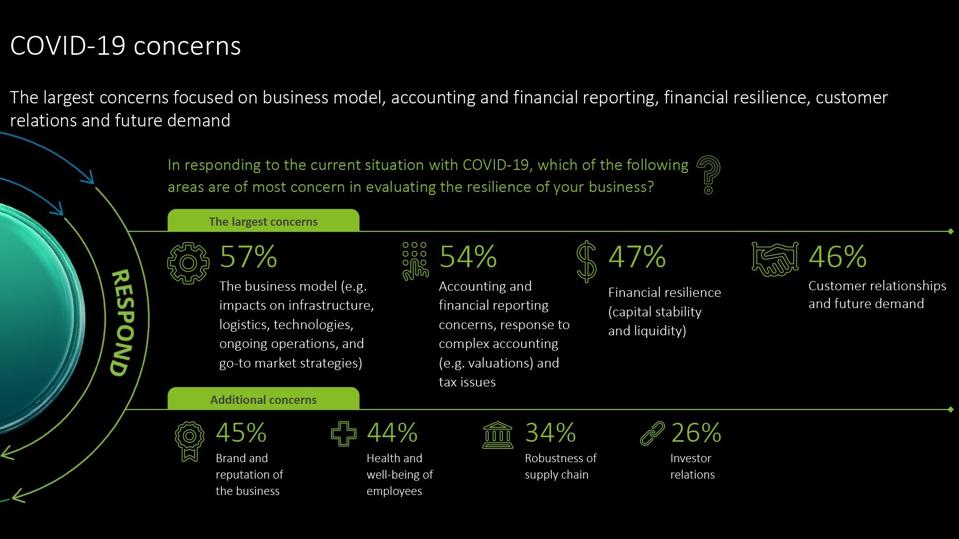The COVID-19 crisis has exacerbated the existing challenges facing businesses and exposed new risks that must be addressed. To better understand these challenges, Deloitte Global conducted a survey of 351 respondents from around the world in April and May 2020, at the height of the initial global COVID-19 lockdown.
DELOITTE GLOBAL
Through this survey, we sought to better understand the value that c-suite, finance and audit committee executives, investors, shareholders, and board members place on audit as a result of COVID-19.
The results unveil some of the most pressing COVID-19 concerns, many of which are still relevant today, as well as executives’ changing perceptions about the role of auditors in approaching these challenges.
The importance of assessing risk
Deloitte’s survey reveals respondents were seeking insights that could help them assess the risk presented by COVID-19 or similar “black swan events.” In fact, 90% of executives in our survey felt that management could benefit by taking a page from the auditor’s playbook in assessing risks from such events. For example, adhering to sound internal controls principles and practices, employing robust systems of quality control, and entrenching a culture of ethics and integrity can go a long way to helping an organization remain resilient in times of crisis.
Businesses that seek to understand the long-term impacts of the crisis on their operating models are more likely to find new ways to quickly adapt to the post-COVID-19 world. To navigate this emerging environment, all participants in the financial reporting ecosystem from companies and boards to regulators, auditors, and investors, will need to continue to participate in regular and transparent engagement.
Successful businesses will find opportunities to learn from the COVID-19 crisis and use their experiences to prepare for future disruptive events. For example, some companies—Deloitte included—are leveraging their cloud infrastructure and investments in innovative collaboration tools as well as virtual learning.
Addressing resiliency concerns
While the pandemic has exposed weaknesses in the ways some businesses operate, it’s also ushered in a new reality of virtual working. Driving a reliance on digital technology and collaboration tools has left many executives concerned about the long-term efficacy of their pre-COVID-19 business strategies. When asked about the resilience of their companies during COVID-19, the two largest concerns for respondents were viability of their business models (e.g., impacts on infrastructure, logistics, technologies, ongoing operations, and go-to market strategies) (57%) and accounting and financial reporting issues (54%).
When viewed by geography, respondent concerns shifted somewhat. Brazil, France, India, and the US rated business model concerns the highest. European respondents in general showed greater concern for the health and well-being of their employees (49%), and Asia Pacific respondents’ had the greatest concern for customer relationships and future demand (49%).
The pandemic has impacted industries in different ways, and the results reflected these differences in executives’ concern by sector.
For example, consumer products companies cited financial resilience (capital stability and liquidity) and liquidity as their top concern (64%), while companies in the financial services industry were most concerned with the brand and reputation of their businesses (55%).
Evolving the financial reporting ecosystem
The economic and health crisis resulting from the pandemic has also caused the process of financial reporting to be far more challenging than before. Professionals must now deal with travel restrictions which prevent routine in- person meetings and activities, market volatility that impacts estimates and valuations, challenges of cross-border data sharing, and complex tax implications of work-from-home mandates. It is therefore unsurprising that 54% of executives shared that navigating accounting and financial reporting issues was a top concern—this was an especially common concern among investors. They are seeking objective insight about systems of control and quality that informs guidance in difficult decisions relating to forecasts, estimates, and other judgments related to valuations and complex accounting treatments.
DELOITTE GLOBAL
When asked what actions their businesses were planning to take to respond to COVID-19 challenges, 63% of executives said they were focusing on communications with investors and stakeholders on business challenges and impacts. This response amplifies the positive potential impact that constructive engagement throughout the financial reporting ecosystem could have on markets.
Many regulators have acknowledged the uncertainties created by COVID-19 and emphasized the need for high-quality reporting that includes the transparent disclosure of new risks and assumptions made. These comments have provided some assurance for reporters and users of financial statements alike, and more regulator input will go a long way in reinforcing trust and reliability.
Access to timely, transparent, meaningful data and insights to inform financial reporting and associated disclosures remains critical. It enables stakeholders— investors, employees, suppliers, governments, and regulators—to identify which companies have so-far mitigated the disruptive effects of the pandemic.
Looking forward
As businesses continue to adjust to the new normal, understanding the long-term effects of the pandemic and what actions we all need to take is critical. COVID-19 has revealed just how disruptive events can be on “business as usual” and emphasized the need for future planning. With threats like climate change ramping up there is a lot to be considered and planned for. Further, the pandemic has brought into sharper focus the need for transparent and reliable information beyond historical financial statements.
Doing business has been forever changed, including how auditors operate. It is clear that the auditing profession has an important role to play in advancing economic recovery. This is why the conversation around the future of audit is so critical at this moment in time.


No comments:
Post a Comment